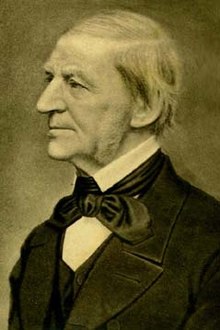The American Scholar
The American Scholar is a speech Ralph Waldo Emerson gave to the Phi Beta Kappa Society in Cambridge , Massachusetts on August 31, 1837 . He had been invited to speak about his new work, Nature , published the year before, in which he gave America's growing society a new perspective on the world. Sixty years after the Declaration of Independence, American culture was still deeply indebted to European culture, and Emerson offered, perhaps for the first time in the country's history, a visionary philosophical framework for escaping pressure and forging a new, distinct American identity.
Summary
Emerson uses transcendental and romantic positions to convey his position and to explain the true relationship of an American scholar to nature. A few key thoughts illustrate the core of this vision:
- We are all, just as the hand divides into five fingers, fragments of a greater creature which is humanity itself, a new and sublime teaching.
- An individual can live in one of two states. In the one, busy, divided, or degenerate state, it does not own itself, but identifies with its activity or a monotonous occupation; in the other, correct state it is raised to a human level, one with all of humanity.
- In order to attain this higher state of mind, the American scholar must discard old ideas and think for himself in order to become a thinking person instead of a simple thinker, or worse, a parrot of other people's thoughts, a victim of society, a lazy mind of this continent.
- The American scholar, as a thinking person, is obliged, within the framework of this concept of the one person, to see the world clearly, not strongly influenced by traditional / historical perspectives, and to constantly expand his understanding of the world through a fresh look, never the call of the To succumb to the people.
- The formation of the scholar consists of three goals:
- to explore nature and understand what includes the mind and person of the scholar.
- studying the spirit of the past: reading literature, contemplating art, examining institutions.
- to act and interact with the world; not becoming a withdrawn scholar commenting from afar.
- The scholar's job is to inspire, call, and guide people by showing them facts in the midst of apparitions.
meaning
Oliver Wendell Holmes, Sr. stated that this speech was America's "Intellectual Declaration of Independence". That speech, built on the attention the essay Nature received, cemented Emerson's popularity and weight in America for the rest of his life. The magazine of the Phi Beta Kappa Society The American Scholar is named after this speech.
Individual evidence
- ↑ Susan Cheever: American Bloomsbury: Louisa May Alcott, Ralph Waldo Emerson, Margaret Fuller, Nathaniel Hawthorne, and Henry David Thoreau; Their Lives, Their Loves, Their Work . Thorndike Press, Detroit 2006, Large print edition, p. 80, ISBN 078629521X .
literature
- "The American Scholar" in German in: Three speeches. About education, religion and Henry David Thoreau , introduction by Dieter Schulz, Derk Janßen Verlag, Freiburg 2007, ISBN 978-3-938871-01-0
- Kenneth Sacks: Understanding Emerson: "The American Scholar" and His Struggle For Self-Reliance . Princeton, New Jersey: Princeton University Press, 2003. 199 pages ISBN 978-0-6910-9982-8
